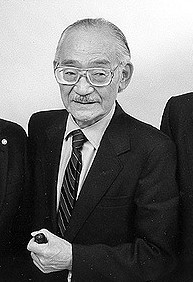Minoru Yasui
| Minoru Yasui | |
|---|---|

Minoru Yasui
|
|
| Born |
October 19, 1916 Hood River, Oregon, United States |
| Died | November 12, 1986 (aged 70) Denver, Colorado, United States |
| Resting place | Hood River, Oregon, United States |
| Other names | Min |
| Occupation | Lawyer |
| Spouse(s) | True Shibata |
Minoru "Min" Yasui (安井稔 Yasui Minoru?, October 19, 1916 – November 12, 1986) was a Japanese American lawyer from Oregon. Born in Hood River, Oregon, he earned both an undergraduate degree and his law degree at the University of Oregon. He was one of the few Japanese Americans after the bombing of Pearl Harbor who fought laws that directly targeted Japanese Americans or Japanese immigrants. His case was the first case to test the constitutionality of the curfews targeted at minority groups.
His case would make its way to the United States Supreme Court, where his conviction for breaking curfew was affirmed. After internment during most of World War II, he moved to Denver, Colorado in 1944. In Denver, Yasui married and became a local leader in civic affairs, including leadership positions in the Japanese American Citizens League. In 1986, his criminal conviction was overturned by the federal court.
In 2015, Senator Mazie K. Hirono nominated Yasui for the Presidential Medal of Freedom, the highest civilian award of the United States. On November 16, 2015, President Barack Obama announced that Yasui would receive a posthumous Presidential Medal of Freedom. The Medal was presented to Lori Yasui in a White House ceremony November 24, 2015.
Born in Hood River, Oregon, on October 19, 1916, Minoru Yasui was the son of Japanese immigrants Shidzuyo and Masuo Yasui. The third son of nine children born to this fruit-farming family, he graduated from the local high school in Hood River in 1933. At the age of eight he spent a summer in Japan, and later was enrolled in a Japanese language school in Oregon for three years. Yasui went on to college after high school at the University of Oregon in Eugene. At the school Yasui earned a bachelor's degree from the school in 1937 and a law degree from the University of Oregon Law School in 1939. He also was a member of the United States Army's Reserve Officer Training Corps (ROTC) program at the university, earning a commission after graduation in 1937. ROTC was a requirement of all male students during this time period for the first two years of the four-year program. Yasui was commissioned on December 8, 1937, as a second lieutenant in the Army's Infantry Reserve.
...
Wikipedia
